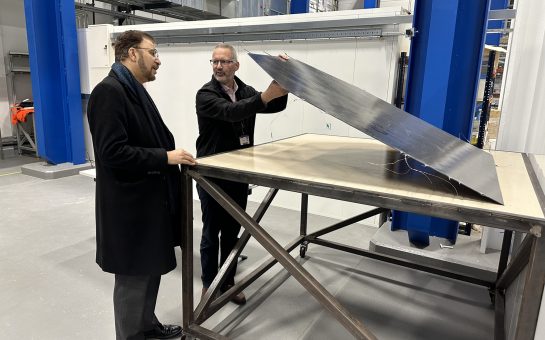Manchester’s innovative discovery – graphene – is set to become commercialised under new plans announced in today’s Budget.
George Osborne announced the new material will receive up to £74million over five years in a bid to introduce the product into the commercialised sector.
The Chancellor of the Exchequer explained in the Budget that the money will ‘provide small and medium enterprises with access to cutting-edge equipment for research and development of novel graphene products’.
“I think this is great news,” said Dr. Aravind Vijayaraghavan, a lecturer at the University of Manchester in nanomaterials and a pioneer in the development of the substance.
“It’s good the government is investing more and that there is more industrial and commercial involvement so this is good to see.”
The substance was discovered in 2004 by University of Manchester researchers Andre Geim and Konstantin Novoselov, who both won a Nobel prize for their incredible finding in 2010.
Graphene is a two-dimensional material consisting of a single layer of carbon atoms arranged in a honeycomb or chicken wire structure.
It is the thinnest material ever discovered but is also the strongest as it can withstand greater strain than steel or even diamonds.
It conducts electricity as efficiently as copper and outperforms all other materials as a conductor of heat.
It is also almost completely transparent, yet so dense that even the smallest atom cannot pass through it meaning it has the potential to become a vital material for products in the future.
“Fundamentally, graphite is what you find in pencil lead and under a microscope it looks like a stack of paper or a pack of cards,” said Dr Vijayaraghavan.
“One of these atoms is graphene which is stronger than any material we have come across, stronger even than steel and diamonds.”
Despite the statement from Mr Osborne about using the material on an industrial scale, Dr Vijayaraghavan is keen to stress that the use of it could be limited.
“Realistically, it is not going to be everything that will use the material in the future,” he said.
“It has the potential to be used in every aspect of life in some way.
“It’s very early though to see if it will live up to its promise but certainly the science is very promising and there are other things which will be a factor.
“Price and manufacturing are also key factors which will determine the future of the material.
“We have a number of prototypes that are being developed at the moment such as touch screens on phones and we have thousands of others which are also being developed.
“Here at the University of Manchester, we are well placed as we have 10-15 of the top academics on the subject in the world so we are well placed to take advantage.”
As well as boosting graphene funding, the Budget also honoured a Manchester war hero in proposed new plans.
An Alan Turing Institute will be set up to honour the memory of the man who broke the German enigma code during World War II.
The government will provide £42million over 5 years for the Alan Turing Institute – a national centre which will enable the UK to lead the way in, and reap the benefits from, Big Data science.
Main image courtesy of University of Manchester via Youtube, with thanks



